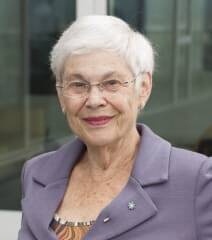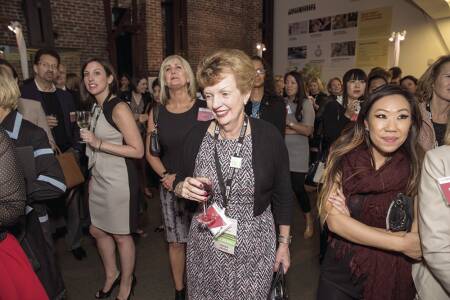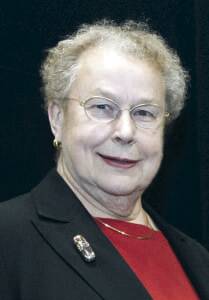In 1970, Nina J. Gruen and her husband, Claude, founded San Francisco market research firm Gruen Gruen + Associates (GG+A), where she serves as executive vice president and principal sociologist and he is principal economist. She recently composed a recollection of the challenges she faced establishing a professional career during the 1960s and 1970s, when societal—and her family’s—expectations discouraged women, particularly mothers, from full participation in the workforce and business-related organizations. In an excerpt from her retrospective on six decades of professional development and leadership, Gruen recounts her experiences upon joining ULI in 1971 as one its first female members. She became the Institute’s first female trustee in 1982.
I am fortunate in that I have been able to maintain mentor/friendship relationships with women who are starting out, as well as when they are climbing the rungs of their career ladders. I have frequently been asked, as a woman professional, what it was like establishing a career during the 1960s and 1970s. When I offer examples from my early experiences, I am first met with looks of disbelief, and sometimes comments suggesting I must be making this stuff up.
As a consultant who, throughout her career, has analyzed changes in consumer behavior based on demographic, cultural, and technological change, I never could have guessed when I began work in 1964 that in 2015 professional women would delay marriage and childbirth to their 30s, if then, and that no longer would it be anomalous for women to be primary wage earners while their husbands are the primary child care providers.
Related: Women in Leadership in the Real Estate and Land Use Industry
It is important to point out that in my era, women were consistently taught that being mothers and housewives was their primary obligation and most important role in life. In 1951, at 18 years of age, I had the first of my five children. I did not attend university until the late 1950s, and although I volunteered my time in school-related and nonprofit organizations, my paid work was extremely limited.
In 1971, I became one of the first women members of ULI, which at that time consisted of fewer than 8,000 male members of the real estate industry. Founded in 1936 for U.S. real estate professionals to share ideas and experiences, it has grown to be a global organization with more than 36,000 members.
ULI’s governance structure is built around councils composed of small groups of 50 or fewer individuals who share a common business interest in a particular type of land use development or policy. After joining the Institute, I participated in some of its studies of housing policy issues, drawing heavily on my experiences at GG+A, where a major part of our work at that time was conducting market studies for residential developers. Within a year or two, I was invited to become a member of the Housing Council. My acceptance made me the first woman to be allowed to join any ULI council.
Group discussion was encouraged at my first council meeting, but for the first two-plus hours I was silent. When I finally did voice an opinion, one of the council members responded in a loud voice, “That was an intelligent comment for a woman.” When I met my husband, Claude, for lunch shortly thereafter, he was more than surprised when I immediately ordered a drink, given the fact that I’m typically a half-glass-of-wine drinker. That comment has stayed with me for 40-plus years. Had I had the sense of humor I have now, I could have and would have come up with a witty retort.
What I learned over the following years was this: Approximately 10 percent to 15 percent of the men were very supportive. They were primarily the older members of ULI. But about 20 percent to 25 percent were extremely hostile. While they were of all ages, most were within ten years of my age at that time. The remainder were pretty much indifferent. This did not surprise me, because the breakdown in attitude was not atypical. What did surprise me, but which is quite understandable, was that the most hostile people were the wives of members who worked in their husbands’ businesses but who received zero credit for their efforts.
Some of ULI’s older members became my strongest supporters. Roy Drachman, an Arizona developer, became an ongoing supporter and mentor. Roy could not care less about a person’s gender, ethnicity, religion, or age. If you were competent in his eyes, that was all that mattered. It was Roy’s influence that made me the first female chair of a council. My being named chair displeased quite a few of the members on my council. The rudeness they displayed was a replay of my experience teaching an all-male engineering class at the University of Cincinnati in 1963. Luckily, one of our firm’s clients, Greg Linde, who was vice president of the Southern Pacific Company overseeing the company’s real estate, came to my rescue. Greg was a very tall and commanding Swede. To me, he looked like the Vikings must have when he stood up and declared to his fellow council members, “You will listen to the chair.” None of those who had been rude wanted to tangle with Greg, so after his pronouncement, my experience became smooth sailing.
As council chair, I organized and hosted a reception for our members for ULI’s two annual conferences. At these receptions, Claude took over the role of the “traditional spouse,” welcoming and integrating the members, with a particular focus on first-time attendees.
In 1982, I became the first woman to be elected as a ULI trustee. But before my nomination was announced, a board member called Claude to ask his permission. They did not want to offend him by making his wife, and not him, a trustee. When I received the traditional plaque announcing my becoming a trustee, the inscription announced the following: “In recognition of his contributions.” I asked for and received a corrected bronze plaque.
Several years later, ULI’s chairman of the board announced that Leanne Lachman would become the second female board member “because Nina needed a friend.” Leanne was and is a friend, but this time I was able to laugh at the chair’s inappropriate announcement. The two of us subsequently became cochairs of ULI’s Low- and Moderate-Income Housing Task Force.
While women were conspicuously in the minority during the early to mid-1980s, no longer were we an anomaly. Almost all the female members excelled and were well respected in their fields. Best of all, the women were united in their support of their fellow female members and in their willingness to mentor the newest women members. In order to facilitate the latter, six of us decided to host a Women’s Reception at ULI’s two annual meetings, which we organized and financially supported for quite a few years. At that time, the Institute was unwilling to lend support to these receptions. Today, the organization not only hosts the Women’s Reception, but the ULI Foundation supports a Women’s Initiative program that encourages women’s leadership programs.
Lynn Thurber became the second female ULI global chair in 2013 (Marilyn Jordan Taylor in 2005 was the first), and today, women make up 24 percent of the membership. When I am able to attend conferences, I always attend the Women’s Reception, which now includes the male leadership who do not want to be left out. At these receptions, the younger members frequently ask me what it was like in the old days. I hope this helps answer their questions.







